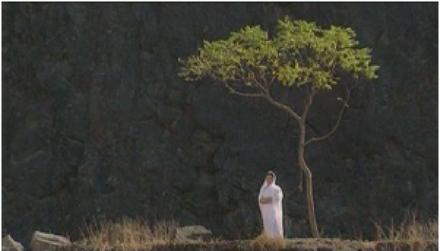![]()
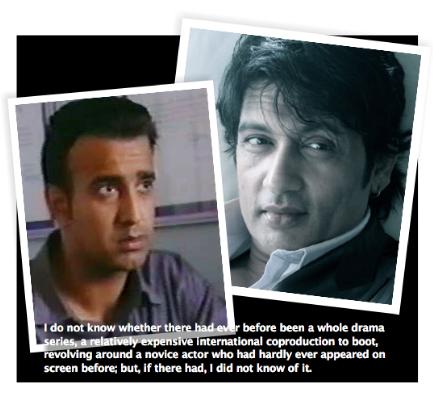
I was in talks with Channel 4 to direct a Bollywood co- production which would be shot largely in Mumbai. I was, of course, thrilled by the prospect, but the six-part mini- series hit a major problem before it had begun. The whole story revolved around a young Glaswegian cop of Indian origin who was taken along as an assistant by an English detective inspector on a trip to trace a drugs trail back to its source in India. At a late stage, the producers started to wonder who could play this part and, after an extensive search, discovered that there was no-one; no actor of the right age and ethnic origin who could also deliver the impossibly difficult Glasgow accent. Their only hope was a soul singer, named Shan Khan.
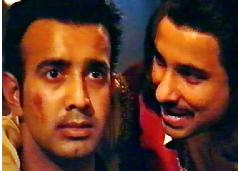 The producers asked me if I would meet Shan and decide whether I thought he would be capable of pulling it off and carrying the series; and, if so, whether I was prepared to work with him. They told me that if the answer waspositive they would finance a short crash course for me, working with a small
The producers asked me if I would meet Shan and decide whether I thought he would be capable of pulling it off and carrying the series; and, if so, whether I was prepared to work with him. They told me that if the answer waspositive they would finance a short crash course for me, working with a small  crew, to take him through the basics of acting on camera before I went out to set up in Mumbai. I recalled that one of the interesting things about The Mastery was that Dan Fauci had said that the process applied, not just to actors, but to all performers, on stage and in life. And, in fact, in my group there had been a couple who, instead of delivery a monologue, had sung songs and played instruments.
crew, to take him through the basics of acting on camera before I went out to set up in Mumbai. I recalled that one of the interesting things about The Mastery was that Dan Fauci had said that the process applied, not just to actors, but to all performers, on stage and in life. And, in fact, in my group there had been a couple who, instead of delivery a monologue, had sung songs and played instruments.
When I met Shan I found him bright, sensitive, and one-hunded-per-cent ready to commit. In fact, he seemed like a natural for the part, and so we shook hands and I went back to devise the syllabus for what I would called The Superstar Screen-acting Academy. We hired a rehearsal room for a week. Paul Gavin, the series director of photography, was free and eager to get in on the action; he brought camera, lights and a few of his regular crew. I decided that we would work long mornings, as is quite usual in TV rehearsals, and that everything would be recorded. At the end of each session Shan would be given the tapes to review at home as well as prepare for the next day’s work.
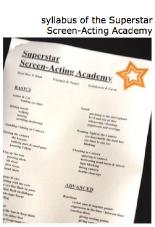 We started off going through the basics that every professional picks up over the years, but, at least at that time, no-one seemed to teach — hitting marks, finding the light, working with camera movements, the eye-line flash, eye-lines to one eye, eye-lines within the matt-box, and so on. It was important that from day one Shan would be able to walk out onto the set and act as if he knew exactly what to expect and what needed to be done.
We started off going through the basics that every professional picks up over the years, but, at least at that time, no-one seemed to teach — hitting marks, finding the light, working with camera movements, the eye-line flash, eye-lines to one eye, eye-lines within the matt-box, and so on. It was important that from day one Shan would be able to walk out onto the set and act as if he knew exactly what to expect and what needed to be done.
As the week progressed we got on to more advanced topics. I was eager to give Shan the benefit of the long days and nights I had spent in the cutting rooms. There are extremely few actors who ever get a grasp of the process and importance of editing because to drop into a cutting room for a few minutes, or even a few hours, will teach you nothing much. It is only by sitting through the long, and often tedious, process of an edit that you will come to understand the reasons why one take is chosen over another, why a cut is made at one point rather than another, and all the problems that arise when assembling and shaping an actor’s performance. So we ran through explosive starts, the difference between cues and impulse points, how to give edit points and become pivotal to a scene by head-turn, change of eye-line, and so on. We did some present sense awareness exercises which lead the way into working on an interior stream of consciousness, which I called, Dreaming on Camera. To bring the Superstar Academy to a close I came to making more direct links with music; rhythm, pace, counterpoint, tone and underlying emotion.
The next time I saw Shan was in Mumbai where he was treated with the deference accorded a star. I do not know whether there had ever before been a whole drama series, a relatively expensive international coproduction to boot, revolving around a novice actor who had never appeared on screen before; but, if there had, I did not know of it. Shan not only had to be on set almost every day, but to perform as equal along side veteran English actor, Donald Sumpter, several Bollywood film stars, and, the highest earning actor in Indian TV, Shekhar Suman.
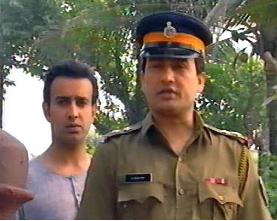 Inevitably, Shekhar would arrive, before his call time, asleep in the back of his car, having come direct from another shoot. His assistant would then come and collect his pages for the day and check any special requirements for makeup and wardrobe. At a precise interval before Shekhar was due on set, he would be woken and handed the pages. At that point he would know nothing at all of what he was scheduled to
Inevitably, Shekhar would arrive, before his call time, asleep in the back of his car, having come direct from another shoot. His assistant would then come and collect his pages for the day and check any special requirements for makeup and wardrobe. At a precise interval before Shekhar was due on set, he would be woken and handed the pages. At that point he would know nothing at all of what he was scheduled to
do that day, and, quite possibly, not even where he was. When I first heard of this routine I was furious, but the truth was that he gave me nothing about which I could complain. By the time Shekhar appeared on set he would be line perfect, and have a sure grasp of exactly what the scene was about. He listened attentively, took direction without argument, always hit his marks, found the lens ... In short, he acted with a professionalism that would put most Britishand American actors to shame.
As for Shan? He coped magnificently, despite disparaging remarks from some other members of the cast when they discovered that he had done nothing before. He had graduated from The Superstar Academy with honours, and I was satisfied that in a week I had given him a fair grounding in how to approach the work and behave on set. What I had not prepared him for was the relentless schedules, the jarring start-stop rhythm, the self-regarding bitchiness, the curious loneliness of the actor’s life.
